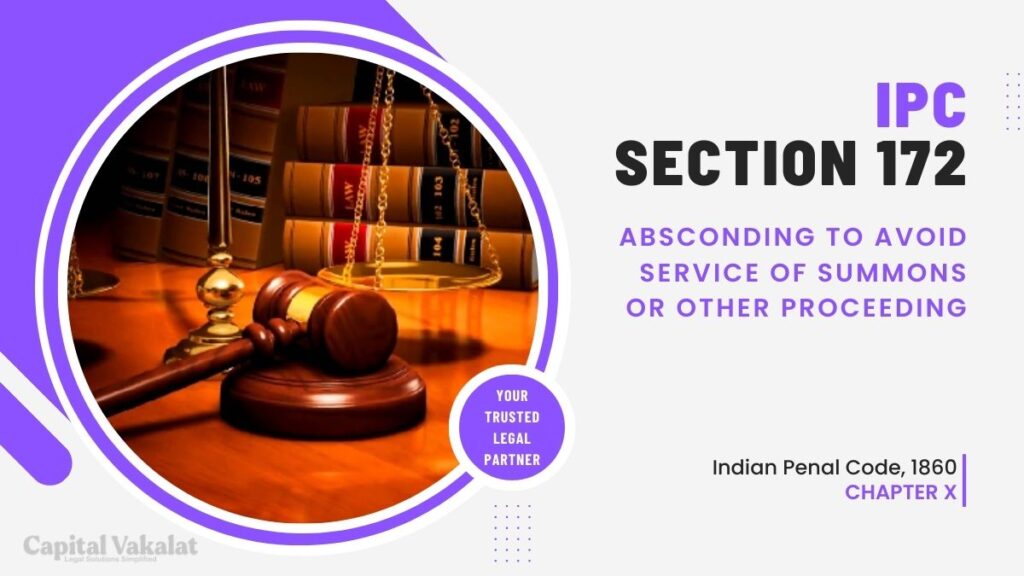In the vast realm of legal provisions, Section 172 of the Indian Penal Code (IPC) addresses a crucial aspect of the legal process – absconding to avoid the service of summons or other proceedings. This section delves into the consequences and implications of intentionally evading legal notifications and obligations. In this comprehensive article, we will explore the intricacies of Section 172 IPC, its significance, and the legal consequences of absconding in the context of the Indian legal system.

The legal landscape of any country is built upon a foundation of intricate laws and regulations, each serving a distinct purpose. Section 172 of the Indian Penal Code (IPC) plays a significant role in ensuring the integrity of legal proceedings. This article will explore the details of this section, shedding light on its importance and the repercussions faced by individuals who abscond to avoid the service of summons or other proceedings.
Understanding Section 172 IPC
Section 172 of the IPC deals explicitly with the offense of absconding to avoid the service of summons or other proceedings. It serves as a deterrent against individuals who attempt to evade legal obligations and responsibilities by staying out of reach. This section is crucial in maintaining the sanctity of the legal system and ensuring that justice is served.
The Offense of Absconding
Absconding, in the context of Section 172 IPC, refers to an individual deliberately evading the service of summons or other proceedings issued by a court or a public servant. Such actions are not taken lightly by the legal system, as they obstruct the due process of law. Absconding is considered a criminal offense and is punishable under the Indian Penal Code.
Legal Consequences of Violating Section 172 IPC
Violating Section 172 IPC can lead to severe legal consequences. Individuals found guilty of this offense may face imprisonment and fines. The extent of punishment depends on the seriousness of the case and the circumstances surrounding the act of absconding. This section is designed to ensure that individuals do not undermine the legal system by avoiding their legal obligations.
Importance of Summons in Legal Proceedings
To comprehend the significance of Section 172 IPC, one must first understand the importance of summons in legal proceedings. Summons serve as official notifications, compelling individuals to appear in court or fulfill their legal obligations. They are a vital component of the legal process and are essential for the fair and just resolution of legal disputes.
Necessity of the Section
Section 172 IPC is a necessary provision in the Indian legal system. Without it, individuals might attempt to subvert the legal process by avoiding summons and other legal proceedings. This section ensures that individuals are held accountable for their actions and do not escape the consequences of their deeds.
Intent and Implications
To establish a case under Section 172 IPC, it is essential to prove that the accused intentionally absconded to avoid the service of summons or other proceedings. The element of intent is crucial, and the prosecution must provide evidence to demonstrate the accused’s deliberate evasion.
The Burden of Proof
In legal proceedings under Section 172 IPC, the burden of proof lies with the prosecution. They must establish that the accused had the intention to evade service and that they did so knowingly. This requires a careful examination of the circumstances surrounding the case.
Court’s Perspective
From the court’s perspective, Section 172 IPC is vital for maintaining the integrity of legal proceedings. It ensures that individuals do not manipulate the system by evading their legal responsibilities. Courts take this offense seriously, and those found guilty face the consequences.
Cases Under Section 172 IPC
There have been numerous cases in India where individuals have been charged under Section 172 IPC for absconding to avoid service of summons or other proceedings. These cases highlight the significance of this legal provision and its impact on the legal system.
Is Absconding the Only Option?
It’s important to note that absconding is not the only option for individuals faced with legal obligations. The legal system provides avenues for addressing grievances and concerns. Absconding only leads to more legal troubles and severe consequences.
Preventive Measures
To avoid falling afoul of Section 172 IPC, individuals should engage with the legal process responsibly. Seeking legal counsel, responding to summons promptly, and fulfilling legal obligations are essential steps in preventing legal issues related to absconding.
Conclusion
In conclusion, Section 172 of the Indian Penal Code plays a vital role in maintaining the integrity of the legal system. Absconding to avoid the service of summons or other proceedings is a serious offense with severe consequences. It is imperative for individuals to understand the gravity of this offense and engage with the legal process responsibly.
This article has shed light on the importance of Section 172 IPC in the Indian legal system, emphasizing the gravity of absconding to avoid legal obligations. It is essential for individuals to be aware of the legal consequences and engage with the legal process responsibly to ensure justice is served.
Frequently Asked Questions
What are the legal consequences of violating Section 172 IPC?
Violating Section 172 IPC can lead to imprisonment and fines, depending on the severity of the case.
How does the court view cases under Section 172 IPC?
Courts take this offense seriously and consider it vital for maintaining the integrity of legal proceedings.
Is absconding the only option when facing legal obligations?
No, absconding is not the only option. There are legal avenues for addressing grievances and concerns.
How can individuals prevent legal issues related to absconding?
Individuals can prevent legal issues by seeking legal counsel, responding to summons promptly, and fulfilling legal obligations responsibly.